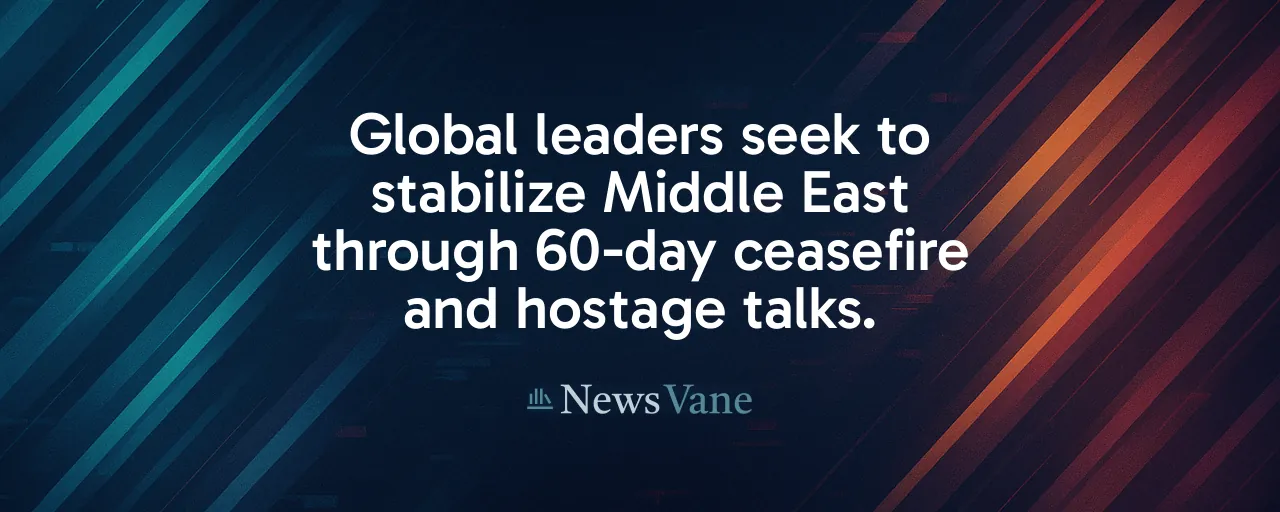A Fragile Truce Sparks Global Action
A 60-day ceasefire between Israel and Hamas, announced in June 2025, has ignited fresh diplomatic efforts to stabilize the Middle East. U.S. Secretary of State Marco Rubio and German Foreign Minister Johann Wadephul held a pivotal call on July 9, 2025, to align strategies on sustaining the truce, securing the release of hostages held by Hamas, and preventing Iran from advancing its nuclear program. Their conversation reflects a broader push for transatlantic cooperation to address intertwined regional challenges.
The ceasefire, a rare pause in a conflict that has claimed thousands of lives since October 2023, hinges on delicate conditions. Israel agreed to the truce provided Hamas releases remaining hostages, a demand that has yet to be fully met. Concerns about Iran's nuclear ambitions loom large, with recent U.S.-Israeli strikes on Iranian facilities underscoring the stakes. Rubio and Wadephul's dialogue signals a commitment to tackle these issues with a blend of diplomacy and firmness.
This moment arrives amid heightened global attention. Energy markets, humanitarian organizations, and regional governments are watching closely, as the ceasefire's success could reshape Gaza's future and influence Iran's behavior. The U.S. and Germany, as key NATO allies, aim to leverage their partnership to drive progress, balancing security imperatives with humanitarian needs.
Balancing Hostage Talks With Regional Stability
Securing the release of hostages remains a top priority. Families of those held by Hamas have kept the issue in the global spotlight, pressing for swift action. Research from the German Institute shows that ceasefires lasting over 45 days can reduce civilian casualties by 40 percent, highlighting the truce's potential to save lives if sustained. The path forward requires Hamas to comply with release terms, a process complicated by past failed negotiations.
Egypt and Qatar, as mediators, have proposed incremental hostage releases tied to ceasefire extensions. Such a framework could unlock humanitarian aid for Gaza, where reconstruction costs are estimated at 12 billion USD. The U.S. and Germany back this approach, advocating for robust verification measures, including UN observers and drone surveillance, to ensure compliance. Their support underscores a belief that linking security and humanitarian goals can build trust.
At the same time, the ceasefire's fragility demands vigilance. Historical data reveals that previous truces collapsed when militant groups rearmed. To counter this, Rubio and Wadephul emphasized the need for third-party guarantors to monitor the truce, a step that could prevent escalation and pave the way for longer-term stability.
Confronting Iran's Nuclear Ambitions
Iran's nuclear program poses a parallel challenge. The International Atomic Energy Agency reported in June 2025 that Iran remains non-compliant with safeguards, holding undeclared nuclear material. Think-tank estimates suggest Iran's breakout time to a nuclear weapon has dropped below three months, raising alarms. While U.S.-Israeli strikes in June delayed Iran's progress, they did not dismantle its core enrichment capabilities.
Diplomacy offers a potential solution. University of Bonn polling shows 68 percent of Germans favor negotiations over military action to address Iran's program. The 2015 nuclear deal, which capped Iran's enrichment, serves as a historical benchmark for what talks can achieve. Rubio and Wadephul discussed reviving a similar framework, pairing sanctions relief with strict monitoring to ensure Iran complies with limits.
A hybrid strategy is gaining traction among experts. Sanctions and deterrence can pressure Iran. Military action alone, without diplomatic channels, risks escalation. The U.S. and Germany aim to align their approaches, using transatlantic unity to strengthen their bargaining power with Tehran while avoiding a broader conflict.
Economic and Social Stakes in Focus
The ceasefire and nuclear talks carry far-reaching economic implications. Instability in the Persian Gulf has already added up to 7 USD per barrel to oil prices in 2025, affecting global markets. Germany, with over 40 billion EUR in annual exports to Gulf states, faces risks if tensions flare. Gaza's humanitarian crisis demands urgent aid, with secure land crossings via Egypt and Israel critical for delivery.
Social dynamics add complexity. In Germany, debates over arms exports to Israel have sparked partisan divides, with legal challenges pending in the Bundestag. Hostage families' advocacy continues to shape public opinion, pressing policymakers to prioritize their release. These pressures highlight the need for a balanced approach that addresses both security and human welfare.
Lessons From the Past Guide the Future
History offers valuable insights. The 2015 nuclear deal with Iran showed that verifiable agreements can curb proliferation, though its collapse in 2018 underscored the need for enforcement. Multiple failed ceasefires since 2023 reveal the challenges of sustaining peace without neutral mediators. The U.S. and Germany draw on these lessons, advocating for a structured process with clear benchmarks.
NATO's long-standing cooperation provides a foundation. Joint U.S.-German efforts in anti-ISIS operations demonstrated their ability to align on Middle East security. Today, their collaboration extends to coordinating sanctions, supporting UN monitoring, and exploring EU-funded reconstruction tied to Gaza's demilitarization. This multifaceted strategy aims to address immediate needs while building a framework for lasting peace.
A Unified Path to Progress
The U.S. and Germany's alignment offers hope for progress. By prioritizing hostage releases, ceasefire verification, and nuclear containment, they address the region's most pressing challenges. Their partnership leverages diplomatic leverage, economic influence, and NATO solidarity to drive outcomes that benefit both the Middle East and the global community.
Success hinges on execution. Sustaining the ceasefire requires Hamas's cooperation and robust monitoring. Curbing Iran's nuclear ambitions demands a delicate balance of pressure and engagement. Humanitarian aid and reconstruction need to reach Gaza's civilians without delay. Rubio and Wadephul's commitment to these goals signals a resolve to navigate these complexities together.
As the world watches, the U.S. and Germany stand at a crossroads. Their ability to translate dialogue into action will shape the Middle East's trajectory, offering a chance to break cycles of conflict and build a more stable future. The stakes are high, with significant potential for meaningful change.
